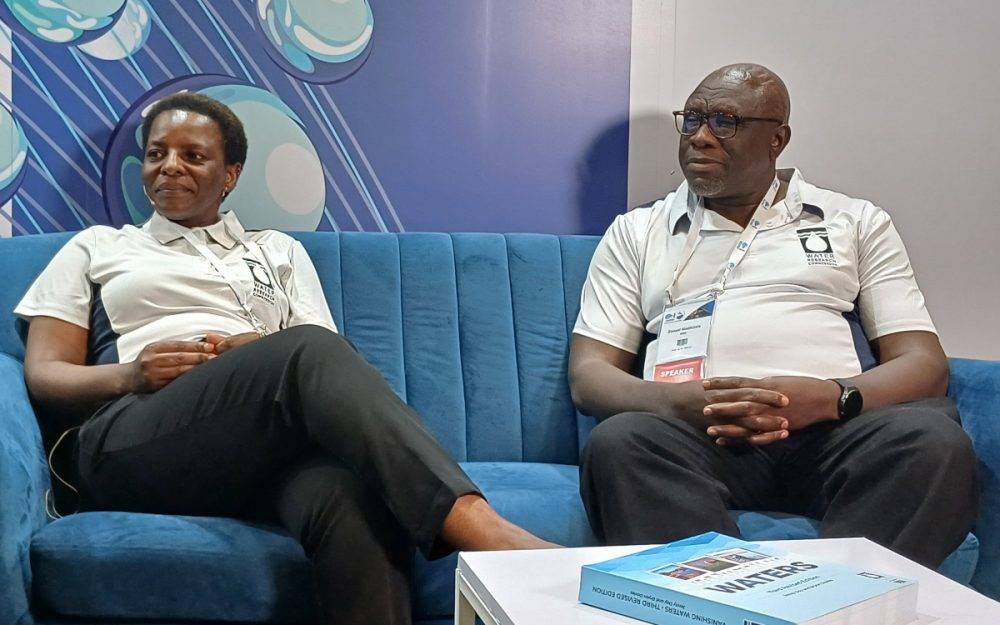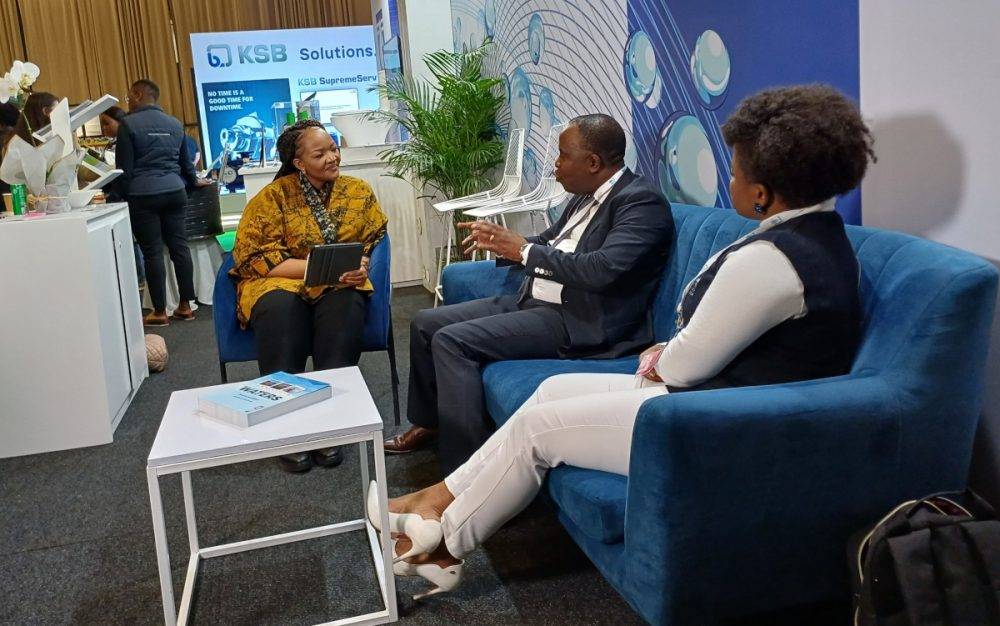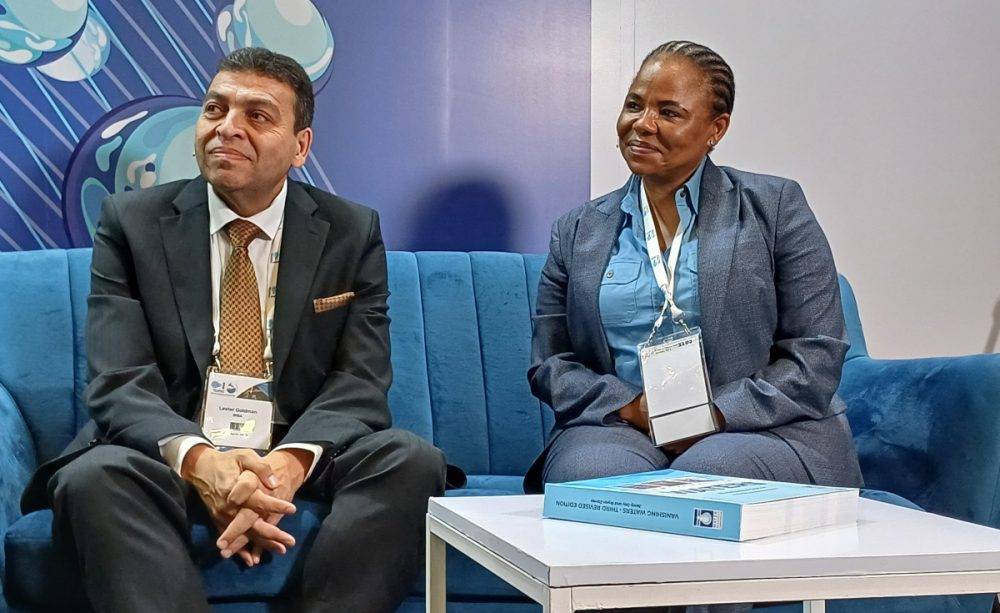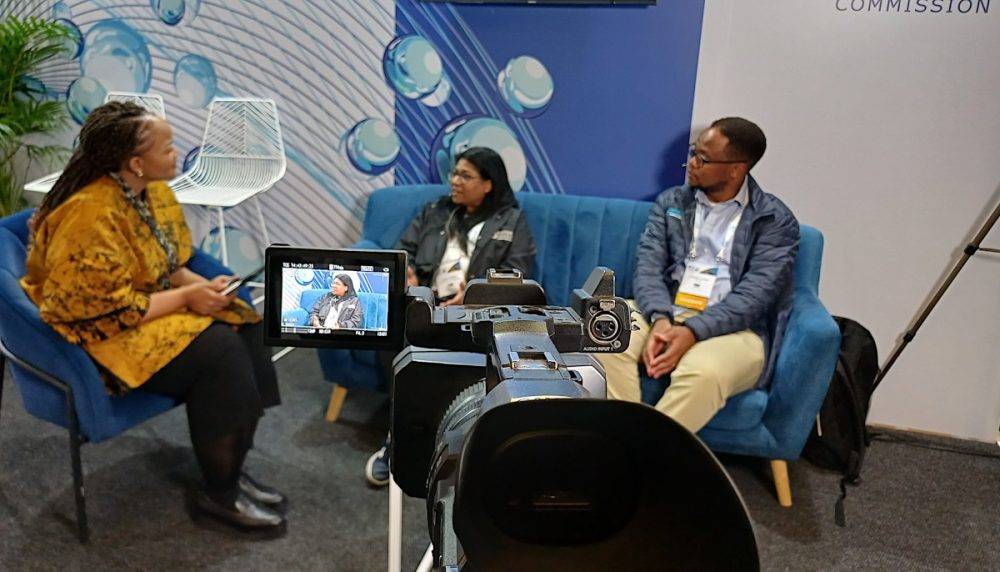
Nonhlanhla Kalebaila, a research manager on water quality at the Water Research Commission and Bonani Madikizela, a water research manager at the Water Research Commission.
It’s time to move beyond the planning and strategy phases and begin implementation
Water experts who gathered in Durban for the WISA 2024 Biennial Conference & Exhibition have issued a stark warning that a fundamental shift in mindset is urgently needed among citizens, officials and the broader Southern African region to address South Africa’s looming water security challenges.
Held at the Inkosi Albert Luthuli International Convention Centre from 12-14 June, experts emphasised the critical need for sustainable usage practices and enhanced service delivery.
During an exclusive media couch session held in partnership with the Mail & Guardian and the Water Research Commission (WRC), hosted by renowned broadcaster Cathy Mohlahlana, some of the country’s top minds in water research raised the alarm for immediate and collaborative action.
 Professor Jean-Marie Kileshye Onema, a WaterNet executive manager and head of the WaterNet Secretariat along with Mamohloding Maahlo-Tlhagale, head of international stakeholder engagement at the Water Research Commission, on the couch with Cathy Mohlahlana at the WISA 2024 Biennial Conference & Exhibition held from 12-14 June 2024.
Professor Jean-Marie Kileshye Onema, a WaterNet executive manager and head of the WaterNet Secretariat along with Mamohloding Maahlo-Tlhagale, head of international stakeholder engagement at the Water Research Commission, on the couch with Cathy Mohlahlana at the WISA 2024 Biennial Conference & Exhibition held from 12-14 June 2024.Key issues discussed included the importance of pollution prevention and waste management to reduce contaminants entering water systems; the necessity of greater collaboration between South African water entities and governing utilities across the Southern African Development Community (SADC) region; and the requirement for a new social compact on water usage
“It is a very important time in our country to reflect on the state of water,” said Water Research Commission CEO Dr Jennifer Molwantwa. “A change in thinking is urgently required.”
Molwantwa stressed the need for collective learning and partnership to foster progress. “We all have to acknowledge that water is everybody’s business, and we have to seriously change our culture around it. The shift in usage must be similar to what we’ve seen with the energy crisis.”
Molwantwa said that officials must act swiftly. “The imminent crisis has created opportunities for us. We need to be reskilled, upskilled, we need to be relevant, we need to be doing the work. We need to change our attitude towards water conservation.”
Molwantwa called for viewing all water sources as interconnected and adapting to shifting rainfall patterns through robust conservation efforts.
 Dr Lester Goldman, CEO of the Water Institute of Southern Africa and Water Research Commission CEO Dr Jennifer Molwantwa.
Dr Lester Goldman, CEO of the Water Institute of Southern Africa and Water Research Commission CEO Dr Jennifer Molwantwa.Dr Lester Goldman, CEO of the Water Institute of Southern Africa (WISA), highlighted infrastructure deficits, particularly at the local government level, as a major issue. “Throughout the value chain of domestic water supply, we need to start focusing on these Achilles’ heels, which are at the local government level,” he said.
Goldman urged prioritising implementation to address issues hindering effective service delivery.
“It’s time we move beyond just the planning and strategy phase and look at the implementation,” he asserted. Goldman noted that water challenges in South Africa mirror those faced by other countries, stressing that strong political will and leadership are crucial.
Nonhlanhla Kalebaila, a research manager on water quality at the Water Research Commission, stressed the importance of monitoring contaminants, noting that many ecosystems are already degraded. “If we prevent pollution at the source, we won’t reach the stage where we need to rehabilitate and restore our water resources,” she said.
Kalebaila pointed out that developed countries show a correlation between water quality status and development. “This value chain of water needs to be managed throughout its cycle,” she added.
Bonani Madikizela, a research manager at the commission, painted a grim picture of contamination levels.
“The water resources in this country, from an environmental protection point of view, are highly degraded, way beyond 65%. Wetlands face degradation of about 85%, which means we are in trouble. We need to focus on restoration.”
Madikizela highlighted the severe issue of eutrophication spreading into rivers. “If you swam in a river 10 years ago and now you cannot do that anymore, then that means that water needs to be rehabilitated,” he said, noting that river health reflects land health.
However, Madikizela expressed hope that innovations could provide solutions. “We are looking at different things that you have never seen before.”
Professor Jean-Marie Kileshye Onema, a WaterNet executive manager and head of the WaterNet Secretariat, which works across the 16 SADC countries, said that water management transcends administrative boundaries. “Our heads of state have understood that if we want to talk about development, we need to cooperate around water resources. We talk about harmonisation of policies, yet at the SADC level, we don’t have a policy that crosscuts regional boundaries.”
 Valerie Naidoo, executive manager at the Water Research Commission and Lubabalo Luyaba of the South African Local Government Association (SALGA).
Valerie Naidoo, executive manager at the Water Research Commission and Lubabalo Luyaba of the South African Local Government Association (SALGA).Kileshye Onema called for greater collaboration, especially concerning transboundary water management.
Mamohloding Maahlo-Tlhagale, head of international stakeholder engagement at the WRC, echoed this sentiment. “Every state has its policies and regulatory mechanisms. The goal is for the countries to find synergy. It’s necessary and we need to work together because if one country does it well and others don’t, it affects all of us,” she said.
Lubabalo Luyaba of the South African Local Government Association (SALGA), which represents municipalities, outlined the challenges municipalities face. “It’s a fairly complex problem,” he said, citing financial constraints and affordability issues for users.
“What that means is that more and more people cannot afford to pay,” he noted. Infrastructure deficits and deteriorating treatment works compound the situation over time. “The question is, how do we continue to provide services in that context?”
Valerie Naidoo of the Water Research Commission highlighted the impacts of failing infrastructure. She warned that restoring degraded systems requires long-term rehabilitation beyond short-term fixes.
We all have a role to play in fixing and maintaining our water services
The Water Research Commission of South Africa (WRC) is advocating for stronger collaboration and innovative management models to address the nation’s water challenges. Speaking at the WISA 2024 Biennial Conference & Exhibition at the International Convention Centre in Durban, WRC CEO Dr Jennifer Molwantwa outlined strategies to mitigate the ongoing water crisis.
Working with the Water Institute of Southern Africa (WISA) among many of its partners, Molwantwa stressed the importance of collaboration and pooling expertise and deploying the right skills to areas in need.
“The WRC and WISA are working together, because working in silos in a country with so many water challenges cannot be the case. We face a water crisis and we all need to help each other,” said Molwantwa.
She said the collaborative nature of WRC has seen it seek partnerships with national, provincial, district and local governments as well as tertiary institutions and other like-minded organisations working towards a water secure future.
Molwantwa underscored that water management is not just a political and human rights issue but also a developmental one. “Water requires long-term planning. Decisions made now will affect communities post-2030 and that is why working together is an absolute imperative,” she stated.
A key element of the WRC’s strategy is the active inclusion of communities in water resource protection. One initiative is the Citizen Science water movement, which involves ordinary citizens in monitoring water quality using cost-effective methods.
“People at the grassroots level can make a difference and must be part of stewardship,” Molwantwa said.
However, she acknowledged significant challenges with the country’s water infrastructure. “Even the infrastructure that was until recently in good condition is now deteriorating and leaking. The problem is worsening, and we still need to provide access to the underserved,” she admitted.
To address these issues, Molwantwa proposed a new management model. “We need competent people running our water services. Our best people should be incentivised to work in remote municipalities where the need is greatest. This is not happening. Politicians should play a regulatory role, protecting the interests of the poor and marginalised, but they should not be running the water business,” she argued.
Molwantwa called for a societal compact involving citizens, the government, and other stakeholders. “We all have a role to play. Until we recognise this, we will continue to blame the government, regardless of which administration is in power,” she said. – Jonathan Erasmus
 (1).png)
 6 months ago
44
6 months ago
44


















